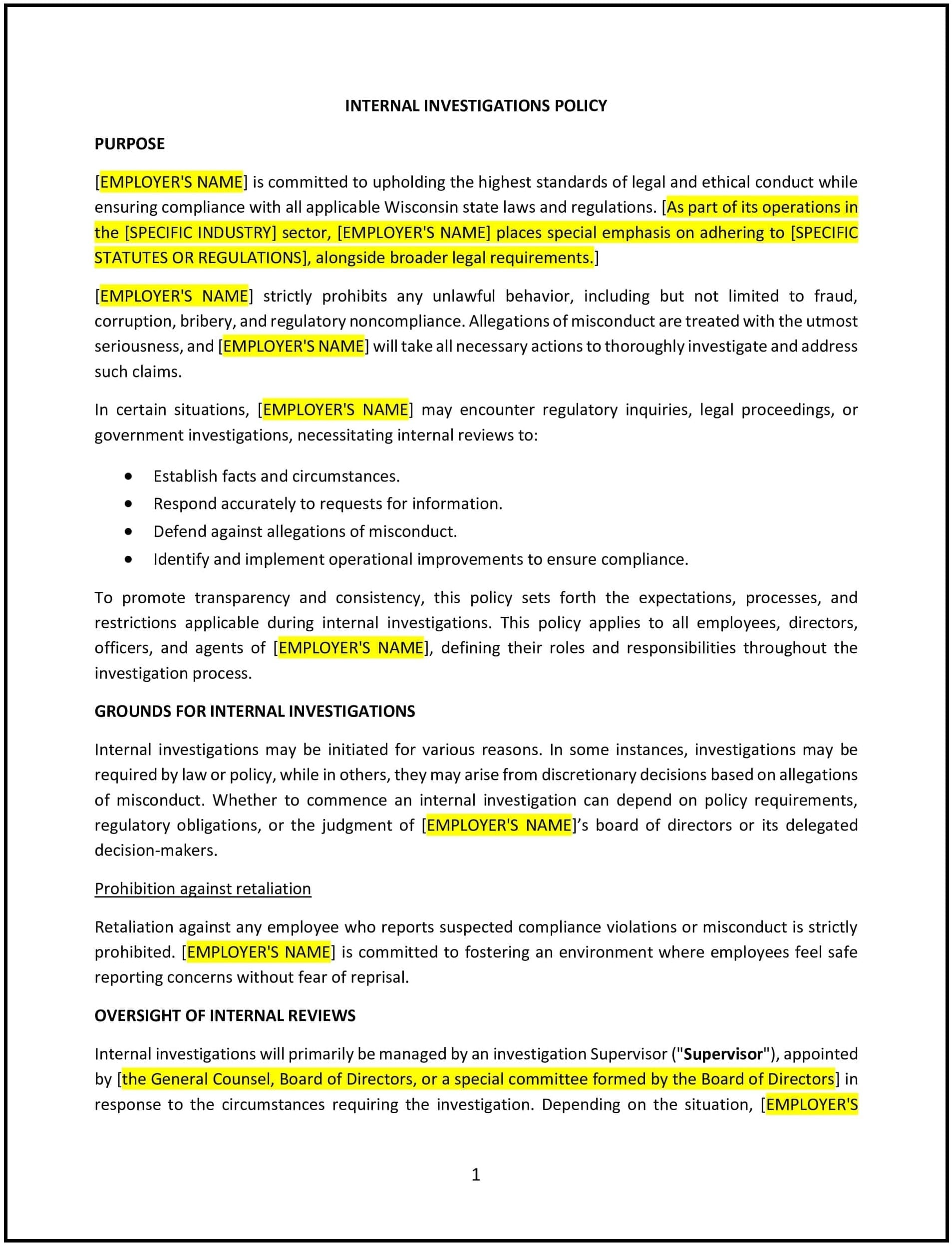Internal investigations policy (Wisconsin): Free template
Got contracts to review? While you're here for policies, let Cobrief make contract review effortless—start your free review now.

Customize this template for free
Internal investigations policy (Wisconsin)
An internal investigations policy helps Wisconsin businesses manage the process of conducting investigations into potential violations of company policies, laws, or ethical standards. This policy outlines the company’s procedures for initiating, conducting, and resolving internal investigations, ensuring transparency, fairness, and confidentiality throughout the process.
By implementing this policy, businesses can address misconduct promptly and fairly, maintain a respectful work environment, and comply with legal and regulatory requirements.
How to use this internal investigations policy (Wisconsin)
- Define the scope of investigations: Specify the types of incidents or behavior that may trigger an internal investigation, including harassment, discrimination, theft, fraud, workplace violence, policy violations, or unethical conduct.
- Identify responsible parties: Designate individuals or teams responsible for conducting investigations, such as HR personnel, legal counsel, or external investigators. Clarify the roles of managers, employees, and any third parties involved in the investigation process.
- Outline the investigation process: Provide a clear step-by-step procedure for conducting investigations, including how complaints will be received, documented, and assessed for validity, the methods of gathering evidence, and how interviews with witnesses or involved parties will be conducted.
- Ensure confidentiality: Emphasize the importance of confidentiality during the investigation process to protect the integrity of the investigation and to ensure that no individual is unfairly prejudiced. Specify who will have access to sensitive information and how it will be handled.
- Set timelines: Establish timelines for each phase of the investigation, including when to expect updates and when the investigation should be completed. Ensure that investigations are conducted promptly to maintain trust and prevent unnecessary delays.
- Provide protection from retaliation: Ensure that employees involved in an investigation, whether as witnesses or as individuals raising concerns, are protected from retaliation. Make clear that the company will not tolerate retaliatory actions against anyone who participates in an investigation.
- Address potential conflicts of interest: Ensure that investigators are impartial and do not have any personal biases or conflicts of interest that could affect the investigation's outcome. If a conflict arises, ensure that a neutral party handles the investigation.
- Document the investigation: Ensure that all steps taken during the investigation, including interviews, evidence collected, and findings, are documented thoroughly. Proper documentation can protect the company and ensure transparency.
- Take appropriate action: After the investigation is concluded, determine what disciplinary or corrective actions, if any, should be taken based on the findings. Ensure that the consequences are fair and consistent with company policies.
- Review and update the policy regularly: Periodically review the internal investigations policy to ensure that it remains effective and is compliant with legal requirements. Update the policy as needed to address new legal developments, emerging risks, or changes in company practices.
Benefits of using this internal investigations policy (Wisconsin)
This policy offers several benefits for Wisconsin businesses:
- Promotes fairness and consistency: By providing a clear, standardized procedure for investigations, the policy helps ensure that all employees are treated fairly and consistently, regardless of their position or seniority.
- Protects the company’s reputation: Conducting investigations in a thorough, impartial, and transparent manner can help protect the company’s reputation, demonstrating a commitment to addressing misconduct and promoting ethical behavior.
- Mitigates legal risks: The policy helps the company comply with relevant laws and regulations, reducing the risk of legal challenges or claims related to mishandling of investigations, discrimination, or retaliation.
- Encourages accountability: The policy reinforces that employees are accountable for their behavior and that misconduct will be addressed appropriately. This helps create a culture of integrity and responsibility.
- Reduces workplace misconduct: By establishing clear expectations and procedures for addressing misconduct, the policy helps deter inappropriate behavior and encourage employees to report concerns without fear of retaliation.
- Builds trust with employees: Employees are more likely to trust the company and feel secure in their work environment when they know that investigations are conducted fairly and transparently.
Tips for using this internal investigations policy (Wisconsin)
- Communicate the policy clearly: Ensure that all employees are aware of the internal investigations policy, how to report concerns, and what they can expect during an investigation. Regularly remind employees of their rights and responsibilities under the policy.
- Train managers and investigators: Provide training to managers, HR personnel, and any designated investigators on how to conduct fair, unbiased investigations and how to handle sensitive information.
- Foster an open reporting environment: Encourage employees to report any concerns or misconduct by ensuring they know how to raise issues safely and without fear of retaliation. Provide multiple reporting channels, including anonymous options if necessary.
- Ensure impartiality: Ensure that investigators remain impartial and objective throughout the process, avoiding conflicts of interest or any appearance of bias. Use external investigators if necessary to ensure a neutral investigation.
- Keep employees informed: While maintaining confidentiality, ensure that employees involved in the investigation are kept informed of the process and any steps that need to be taken. Clear communication can help reduce uncertainty and anxiety.
- Review investigations regularly: Regularly review the outcomes of investigations to identify patterns or areas for improvement in policies, procedures, or employee training. Make adjustments to the process as needed to ensure effectiveness and fairness.